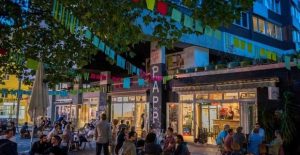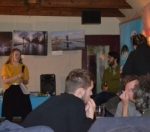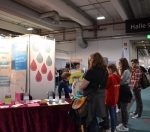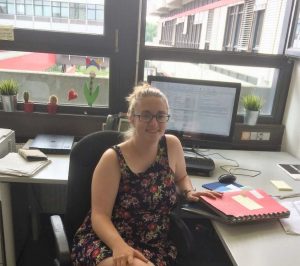Every Fall, Dickinson students take this seminar, together with German students. In this course, we reconstruct and evaluate important stages in the more than 300-years old history of German-American relations. Then we ask in which way both cultures have mutually influenced each other.
First, we looked at German emigration to America. In the US census of 1980, more than one fourth of US Americans stated to have German ancestors. For a long time, Germans represented the largest immigration group in the USA with “parallel societies,” but today Germans are completely assimilated. The special history and stories of German immigration appear to be almost forgotten. In the second part of the seminar, we traced the ambivalent image of America as a motor of modernity and a symbol of capitalism – as it developed in the second half of the 19th century. We saw in which way America has always been seen as the “other,” as a counter project to European culture and society – as model and competitor, myth and object of scrutiny, as a target of wishes and dreams, but also of fears and attacks. In the third part, we critically evaluated the transfer of US American pop culture to the former Federal Republic of Germany (BRD) after 1945, with a side-glance to the German Democratic Republic (GDR). Many points of criticism that have been and still are being voiced towards the American culture (which is supposed to be flat, fixated on money, and the like) seem to be contemporary ideas – and yet, we found out that most of them are actually 100-150 years old.
Based upon these insights, we could eventually analyze up-to-date resentments, recent events, alienations, and stereotypes more profoundly and better classify similarities as well as differences in socio-cultural attitudes of both countries. >Dr. Janine Ludwig<
This is what students said:
In my opinion the class was very interesting. It was a good decision to choose it as “General Studies.” I really liked learning about the history and the relationship between America and Germany. Especially the fact that the class consists of students from both countries was really enriching, because of the different perspectives. That made the discussions in class much more interesting. I really liked how the seminar was structured, that we started with the history 300 years ago and ended with the present. Because of that well-structured system it was very informative. One of the most interesting aspects for me was the emigration from Germany to America. By preparing a presentation about the topic and reading many texts about it, I learned a lot. In this context the trip to Bremerhaven to the “Auswandererhaus” was a great experience for me. >Patricia Brüggemeier<
I especially found this course interesting because not only is it composed of class discussions, but also constitutes presentations and field trips, which were helpful in understanding Germany and its culture. For example, during the semester we had the opportunity to visit two different cities. We first visited the emigration center in Bremerhaven, where German immigrants first took off on their journey to America. There, we were able to experience and learn about the process of the Germans’ emigration and immigration.

Dr. Hans Modrow
In December, we visited Berlin, where we learned much about German politics. One of the most exciting experiences was when we met Dr. Hans Modrow, an East German politician who experienced WW II and was the last communist premier of the GDR. Other than the two field trips, we also presented on topics that we chose in the beginning of the semester. Doing the presentation definitely helped me understand the course material better and also to prepare myself for other “Referate” that I had to do for my other classes. >Kyu Ri Hong<
 Although I have studied American history and German history separately in the past, it was really interesting to focus on how they relate to one another. One thing I especially enjoyed was when Prof. Ludwig talked about her own experiences growing up in the DDR. It was incredible to see the actual files that the Stasi had on her father. To us, the GDR seemed more like history. Now it feels much more recent and learning about it helped me better understand current-day Germany. Personal experiences helped me fully absorb what we were learning. Also, having grown up in Pennsylvania, I was interested in our classes which covered my state’s close ties to Germany. Many people I know have German heritage, and now I understand their history a little better. I feel like I have a much clearer picture of the influence the US and Germany have had over one another. >Frances Youmans<
Although I have studied American history and German history separately in the past, it was really interesting to focus on how they relate to one another. One thing I especially enjoyed was when Prof. Ludwig talked about her own experiences growing up in the DDR. It was incredible to see the actual files that the Stasi had on her father. To us, the GDR seemed more like history. Now it feels much more recent and learning about it helped me better understand current-day Germany. Personal experiences helped me fully absorb what we were learning. Also, having grown up in Pennsylvania, I was interested in our classes which covered my state’s close ties to Germany. Many people I know have German heritage, and now I understand their history a little better. I feel like I have a much clearer picture of the influence the US and Germany have had over one another. >Frances Youmans<
I have never wondered about the relationship between the United States and Germany. Therefore, I’m not sure why I’ve chosen a course called Comparative Cultures – USA / Germany. Anyway, I do have a few prejudices about the USA. Especially in the last one or two years the public opinion in Germany about the image of the USA changed for the worse and so had mine. That’s the reason why it’s so exciting to look back on the history and ask ourselves how and why the relationship between the USA and Germany changed and developed from last 300 years to today. Maybe we can learn something from this history? What I’ve learned is understanding. Understanding for the different historic experiences of each state and how it has formed the societies and their positions on both sides of the Atlantic. I’ve got a new perspective on the relationship between the United States and Germany. >Maike Schukenbrock<
 One topic of the seminar that I enjoyed was the Americanization of Germany. While living in Germany, I have noticed an American influence here. I always hear people referencing Hollywood movies, talking about American bands, or using English words and I never really knew where this came from. I just assumed it had something to do with the American occupation of Germany and the fact that the U.S. is an influential country. It was interesting to learn about the details of Americanization, such as how different groups have reacted to it, what aspects in particular have taken hold in Germany, and why young people have gravitated towards American culture. Both the class readings and ones I found on my own were helpful in better understanding the topic. I enjoyed building off of what we learned in class, while researching for the paper. Because the topic of Americanization is so big, it was nice to be able to focus on what interested me. At the beginning of the semester we did a lesson on German immigration to the U.S. and how Germans have impacted American culture. I liked learning about the exchange between the two countries and how over the past hundreds of years both have played a role in shaping the other’s culture. >Molly Burger<
One topic of the seminar that I enjoyed was the Americanization of Germany. While living in Germany, I have noticed an American influence here. I always hear people referencing Hollywood movies, talking about American bands, or using English words and I never really knew where this came from. I just assumed it had something to do with the American occupation of Germany and the fact that the U.S. is an influential country. It was interesting to learn about the details of Americanization, such as how different groups have reacted to it, what aspects in particular have taken hold in Germany, and why young people have gravitated towards American culture. Both the class readings and ones I found on my own were helpful in better understanding the topic. I enjoyed building off of what we learned in class, while researching for the paper. Because the topic of Americanization is so big, it was nice to be able to focus on what interested me. At the beginning of the semester we did a lesson on German immigration to the U.S. and how Germans have impacted American culture. I liked learning about the exchange between the two countries and how over the past hundreds of years both have played a role in shaping the other’s culture. >Molly Burger<
There were some very interesting parts of German 340, and most topics I found very intriguing, but if I have to pick a favorite, it would be the German influence of Pennsylvanian (in addition to other German communities that existed within the United States). Growing up, my Nana always talked about how we were Pennsylvania Dutch. From her home cooked meals to the way that she decorated her house, she always made a point that she was influenced by Pennsylvania Dutch traditions. I always used to take note of that, but I never really looked into what it really meant until I started studying German 3 years ago. In my previous German classes, the Pennsylvania Dutch traditions were always mentioned, but they were never fully elaborated, as they were in this class. I am very appreciative to have a better understanding of my heritage, as well as the traditions and the historical background that came along with that. I guess my lack of knowledge regarding the traditions that come along with my heritage really attests to how well integrated my German ancestors were into American society. Going to the emigration Museum in Bremerhaven was particularly interesting because I was able to see the common conditions of German immigrants to America. While I was not able to trace back my relatives to see if they immigrated from Bremerhaven because no one in  my family knows the surnames, it was interesting to imagine what it was like for my an-cestors who immigrated to American from Germany all those years ago. I will definitely do some more research and reading on this because of its interesting nature in addition to the personal connection that the topic has for me. >Ben Soder<
my family knows the surnames, it was interesting to imagine what it was like for my an-cestors who immigrated to American from Germany all those years ago. I will definitely do some more research and reading on this because of its interesting nature in addition to the personal connection that the topic has for me. >Ben Soder<
I found the second half of this course particularly interesting because I learned new things about the German history and culture from the last century. In particular, the terms Deutscher Sonderweg and Americanization were both new for me, and I think that they both reveal something very important about the German culture. We discussed that the term Deutscher Sonderweg claims that the country Germany is unique because it has changed its government from aristocracy to democracy in a way that is incomparable to any other European countries. This opinion about the unique German path causes disputes and one can easily argue that every single country is unique in its own way because no country on earth has ever gone through the “normal path.” Furthermore, after the collapse of 1945, the term Sonderweg took a rather negative meaning because of Hitler’s rules and Germany’s fault in the Second World War. After we learned about the Sonderweg, we concentrated a lot on the aftermath of WWII and in particular, the role which the USA has played in Germany and the way the USA has been perceived by the Germans throughout the past decades.
For me it was interesting to learn more about the American influence on the development of German culture in the second half of the last century and to discuss whether or not there is room and proof to believe that the Germans have been Americanized in a different way than any other nation. Some claim this because of the state in which West Germany found itself after WWII – had it not been for the American support, it would probably not have recovered so fast from its loss. The presence of Americans was also important because of the cultural changes and influences that they brought with themselves – economic support and interdependence as well as pop culture were among the most interesting topics for me. I found the last classes that we had (for example, the class in which we discussed rock music or the last class in which we had the debate between “Americans” and “Germans”) very intriguing because the events which we discussed are still relatively fresh in our memory, and I also believe I can relate more so to the last century because my parents and grandparents have talked to me a lot about this period of our history and have shared their own experiences with me. Hence, reading more about this part of the German history gave me a new perspective and helped me understand better the relationship between Germany and the USA and which events have been important in shaping the interdependence between the two countries. >Stefani Zaharieva<
 My WG is located in the Neustadt, an up-and-coming part of Bremen full of students, immigrants and young families who make it a vibrant, yet homey place to live. I am an easy bike ride away from the Altstadt, Hauptbahnhof, Viertel, and the Weser. While Horn, the area in which the Studentenwohnheime are located, is nice, it doesn’t begin to compare to other parts of Bremen such as Neustadt.
My WG is located in the Neustadt, an up-and-coming part of Bremen full of students, immigrants and young families who make it a vibrant, yet homey place to live. I am an easy bike ride away from the Altstadt, Hauptbahnhof, Viertel, and the Weser. While Horn, the area in which the Studentenwohnheime are located, is nice, it doesn’t begin to compare to other parts of Bremen such as Neustadt.













